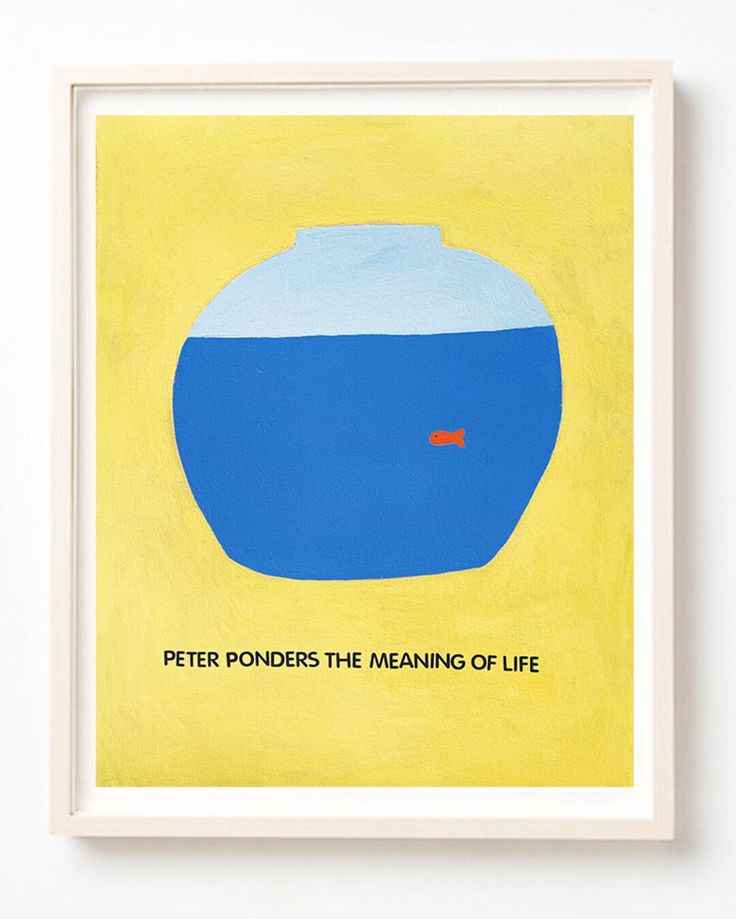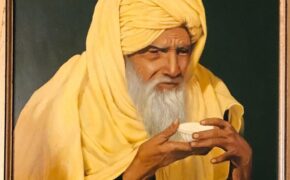Some things you hear or learn have a way of staying with you well after your initial experience with them. For me, “The Meaning of Life’ course by Professor Jay L. Garfield is one of those things. This course offers an extensive look into the perspectives on life from the world’s great intellectual traditions, and surely has something to teach even the most experienced philosopher.
Throughout the course, participants embark on a fascinating journey across time and continents, exploring the insights and wisdom of various intellectual traditions. From ancient philosophies to modern interpretations, each module offers a deep dive into different worldviews and their interpretations of life’s ultimate purpose.
Do you love the above image? If so, check out the fine art print ‘Peter Ponders the Meaning of Life’ here in Esty.
“The Meaning of Life” Course by The Great Courses
What is the “The Meaning of Life” course about?
Participants engage with key concepts and teachings from renowned figures such as Plato, Aristotle, Confucius, Buddha, and more. They examine the fundamental questions of existence, morality, happiness, and the human condition through the lenses of Western philosophy, Eastern spirituality, and indigenous wisdom.
By examining the multifaceted approaches to the meaning of life, participants gain a deeper understanding of themselves and the world around them. The course encourages critical thinking, introspection, and dialogue, inviting participants to reflect on their own beliefs and values while appreciating the diversity of human thought.
Whether you’re a philosopher, a seeker of truth, or simply curious about life’s big questions, “The Meaning of Life” offers a comprehensive exploration of the human quest for meaning and purpose. It is an enriching journey that challenges perspectives, expands horizons, and ultimately invites participants to find their own meaning in the tapestry of existence.
Check here for more articles on Philosophy.
Who is Professor Jay L. Garfield?
Professor Jay L. Garfield is a prominent scholar in the fields of philosophy, Buddhist studies, cognitive science, and cross-cultural philosophy. He has made significant contributions to the study of Madhyamaka Buddhist philosophy, philosophy of mind, philosophy of language, and ethics.
Garfield is known for his interdisciplinary approach, often bridging Eastern and Western philosophical traditions. He has authored numerous books and articles, exploring topics such as Buddhist philosophy, ethics, cognitive science, and the nature of consciousness.
Garfield holds appointments at several prestigious institutions, including Smith College, where he is the Doris Silbert Professor in the Humanities, and the University of Melbourne, where he serves as the Kwan Im Thong Hood Cho Temple Professor of Humanities. He has also taught at institutions such as Harvard University, the University of Pittsburgh, and the Central University of Tibetan Studies in India.
Beyond academia, Garfield is actively involved in promoting dialogue and collaboration between Buddhist and Western philosophical traditions. He has served as a translator for Tibetan Buddhist texts and has been involved in various initiatives aimed at fostering cross-cultural understanding and cooperation.
Overall, Professor Jay L. Garfield is recognized for his scholarship, teaching, and advocacy in the fields of philosophy and Buddhist studies, making significant contributions to both academic discourse and broader societal discussions.
Why do I recommend “The Meaning of Life” by The Great Courses?
In our quest for understanding and purpose, few inquiries are as profound and enduring as that of the meaning of life. It’s a question that has captivated thinkers, philosophers, and seekers across cultures and epochs, inspiring countless explorations and interpretations. There are always a wide array of reasons for this innate curiosity that seems to have plagued those who ponder the human condition. Let’s embark on a journey through this enriching exploration of life’s ultimate questions.
Delving into Diverse Traditions
Led by esteemed scholars and experts, “The Meaning of Life” offers a panoramic view of human thought and wisdom, spanning continents, epochs, and intellectual traditions. Through engaging lectures and immersive discussions, participants are invited to delve into the profound insights of various philosophical, religious, and cultural perspectives on life’s purpose.
Unveiling Philosophical Gems
From the ancient philosophies of Greece and China to the timeless wisdom of Eastern spirituality and modern existentialism, each module of the course unveils a treasure trove of philosophical gems. Participants encounter the teachings of luminaries such as Plato, Confucius, Buddha, Nietzsche, and more, each offering unique insights into the human condition and the quest for meaning.
Bridging East and West
What sets “The Meaning of Life” course apart is its commitment to cross-cultural dialogue and exchange. By juxtaposing Eastern and Western philosophical traditions, participants gain a holistic understanding of life’s ultimate questions, transcending geographical and temporal boundaries. From the Stoic ideals of virtue to the Zen concept of mindfulness, each tradition enriches our understanding of the human quest for meaning.
Nurturing Personal Reflection
Beyond intellectual exploration, “The Meaning of Life” course serves as a catalyst for personal growth and reflection. Participants are encouraged to interrogate their own beliefs, values, and assumptions about life’s purpose, fostering a deeper understanding of themselves and the world around them. Through introspection and dialogue, they embark on a journey of self-discovery and meaning-making.
Embracing the Journey
As we navigate the complexities of existence, “The Meaning of Life” course reminds us that the quest for meaning is not a destination but a journey—a journey that invites us to embrace the mystery, wonder, and beauty of life itself. Whether grappling with existential angst or savouring moments of transcendence, each step on this philosophical odyssey brings us closer to understanding our place in the universe.
My key take aways from this course: The unique perspectives offered by Native Americans, in this case, the Lakota Sioux medicine man and writer, John Lame Deer.

Why is it important to study the philosophy of the meaning of life?
In the vast expanse of human inquiry, few questions loom as large or as enduring as that of the meaning of life. It’s a question that has captivated philosophers, theologians, scientists, and seekers throughout the ages, transcending cultures, epochs, and belief systems. As we embark on a journey to unravel this existential puzzle, let’s delve into the rich tapestry of thought that surrounds this profound inquiry.
At its core, the question of the meaning of life beckons us to contemplate the very nature of existence itself. What is the purpose of our existence? Do we have a predetermined destiny, or are we free to forge our own path? These foundational inquiries underpin the philosophical quest for meaning, driving us to explore the fundamental truths that govern our lives.
Throughout history, philosophers have offered a myriad of perspectives on the meaning of life, each reflecting unique cultural, religious, and philosophical traditions. From the ancient Greeks to contemporary thinkers, the quest for meaning has inspired diverse and often contradictory interpretations.
Ancient Wisdom: In ancient Greece, philosophers such as Plato and Aristotle pondered the nature of the good life and the pursuit of eudaimonia, or human flourishing. Their teachings emphasized the importance of virtue, reason, and the cultivation of the soul as pathways to a meaningful existence.
Eastern Insights: Eastern philosophies, such as Buddhism and Taoism, offer profound insights into the nature of existence and the quest for enlightenment. From the Four Noble Truths of Buddhism to the concept of Wu Wei in Taoism, these traditions explore the nature of suffering, impermanence, and the interconnectedness of all things.
Existential Angst: In the modern era, existentialist thinkers such as Jean-Paul Sartre and Albert Camus grappled with the absurdity and meaninglessness of human existence. Their writings explore themes of freedom, responsibility, and the search for meaning in a seemingly indifferent universe.
As we navigate the complexities of the modern world, the question of the meaning of life remains as relevant and elusive as ever. In our pursuit of happiness, fulfilment, and purpose, we draw upon the wisdom of past thinkers while forging new pathways of understanding and exploration.
Final thoughts on “The Meaning of Life” Course by The Great Courses
Ultimately, the quest for meaning is a deeply personal and subjective journey—one that invites us to explore the depths of our own hearts and minds. Whether through philosophy, religion, science, or art, each of us is called to seek our own answers to life’s ultimate question, embracing the richness and complexity of the human experience along the way.
As we embark on this philosophical odyssey, let us remember that the meaning of life is not merely a destination to be reached but a journey to be savoured—a journey that invites us to embrace the mystery, wonder, and beauty of existence itself.
To take a closer look at this phenomenal course please visit “The Meaning of Life” course by The Great Courses here.
FOR MORE FANTASTIC FINDS, MAKE SURE TO VISIT MY STORE BELOW
Amazon has graciously invited me to take part in their Amazon Influencer Program. As such, I now have a storefront on Amazon. Don’t forget to check it out to see all my favourite products, such as my bookshelf, my summer and winter fashion finds, and my go-to holistic health products. Please note that some of my posts may contain affiliate links. If you click on an affiliate link and later make a purchase, I may receive a small commission. Clicking on an affiliate link may earn a commission but does not result in additional charges to you or cost you anything extra. However, it helps to support me to keep bringing you honest work.



